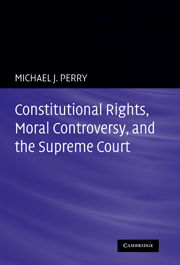Book contents
- Frontmatter
- Contents
- Acknowledgments
- Introduction: A (partial) Theory of Judicial Review
- 1 Human Rights: From Morality to Constitutional Law
- 2 Constitutionally Entrenched Human Rights, the Supreme Court, and Thayerian Deference
- 3 Capital Punishment
- 4 Same-sex Unions
- 5 Abortion
- 6 Thayerian Deference Revisited
- Postscript: Religion as a Basis of Lawmaking? Herein of the Non-establishment of Religion
- Index
6 - Thayerian Deference Revisited
Published online by Cambridge University Press: 05 July 2009
- Frontmatter
- Contents
- Acknowledgments
- Introduction: A (partial) Theory of Judicial Review
- 1 Human Rights: From Morality to Constitutional Law
- 2 Constitutionally Entrenched Human Rights, the Supreme Court, and Thayerian Deference
- 3 Capital Punishment
- 4 Same-sex Unions
- 5 Abortion
- 6 Thayerian Deference Revisited
- Postscript: Religion as a Basis of Lawmaking? Herein of the Non-establishment of Religion
- Index
Summary
The ultimate arbiter of what is rational and permissible is indeed always the courts, so far as litigated cases bring the question before them. This leaves to our courts a great and stately jurisdiction. It will only imperil the whole of it if it is sought to give them more. They must not step into the shoes of the law-maker …
– James Bradley ThayerLet's now return to the question with which Chapter 2 concluded:
In exercising its great power to protect constitutionally entrenched human rights, should the Supreme Court of the United States proceed deferentially; in a case in which it is claimed that a law violates a constitutionally entrenched human right, should the Supreme Court, as Thayer counselled, inquire merely whether the counterclaim that the law does not violate the right is reasonable – and if the Court answers yes, uphold the law? Or, instead, should the Court determine for itself whether the law violates the right – and if it answers yes, strike down the law?
Richard Posner recently observed, approvingly, that “American judges distinguish between how they might vote on a statute if they were legislators and whether the statute is unconstitutional; they might think it a bad statute yet uphold its constitutionality.” Thayer urged American judges to make a further distinction: between whether the statute is unconstitutional and whether the claim that the statute is not unconstitutional is reasonable. The latter question, Thayer insisted, is the one judges should address.
- Type
- Chapter
- Information
- Constitutional Rights, Moral Controversy, and the Supreme Court , pp. 169 - 188Publisher: Cambridge University PressPrint publication year: 2008



